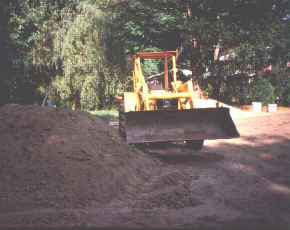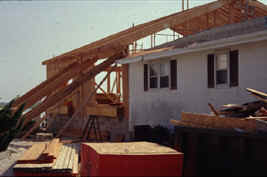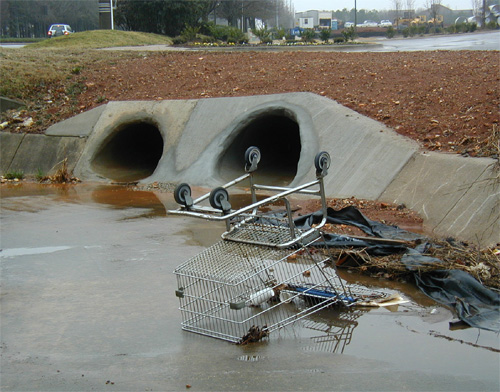Flood Protection Laws
Permits
Development in floodprone areas is development in harm’s way. New construction in the floodplain increases the amount of development exposed to damage and can aggravate flooding on neighboring properties.
Most subdivisions were designed to prevent drainage problems. Lots were laid out and built so water would flow away from the building and along property lines to the street, storm sewer, or ditch. Fences, railroad ties, landscaping and regrading can block this flow. So do construction projects in the ditches or the floodplain. Therefore, South Holland has regulations on building and development designed to prevent new construction from making flooding and drainage problems worse.
Before you build on, fill, alter, or regrade your property, always check with the Planning and Development Department (210-2915). A permit may be needed to ensure that such projects do not cause problems on other properties.
These regulations are designed to protect you and your neighbors. By keeping the drainage system clear and getting the proper permits before you build, you can help prevent flooding and other drainage problems. When in doubt, call the Flood Assistance Coordinator at 210-2915.
 |  |
| Filling, grading, obstructions along property lines, or other construction might cause flooding on your property. If you don't see a permit sign posted, call the Planning and Development Department. | |
Floodplain Rules
There are special rules in the Special Flood Hazard Area, i.e., the area shown on the Floodplain Map. If you are planning on building a house, garage, or other structure close to or in that area, check with the Planning and Development Department (210-2915) to see if your site is in the regulated area. If you can stay out of that area, all the better.
If you have to erect a building in the mapped floodplain, it must have its lowest floor (including basement) and all utilities elevated one foot above the base flood elevation shown on the map. Documentation of meeting this requirement is done with a FEMA Elevation Certificate. There are additional restrictions on filling, grading or building in a mapped floodway.

If you have an existing building and want to improve, expand, or repair it, you also need to check with the Planning and Development Department. Our codes also require that all substantial improvements to a building be treated as a new building. A substantial improvement is when the value of an addition, alteration, repair or reconstruction project equals or exceeds 50% of the value of the existing building. In the case of an addition, only the addition must be protected. In the case of an improvement to the original building, the entire building must be protected.
For example, if a house in the floodplain is flooded, has a fire, is hit by a tornado, or is otherwise damaged so that the value of the repairs equals or exceeds 50% of the value of the building before the damage, then the house must be elevated above the base flood level.
These regulations are designed to protect you and your neighbors. By getting the proper permits before you build, you can help prevent flood damage to your own home.
Dumping

Every piece of trash can contribute to flooding. Even leaves, grass clippings and branches can accumulate, plug storm drain inlets and channels, or kill vegetation and contribute to erosion. If your property is next to a ditch or storage basin, do your part and keep the banks clear of brush and debris.
Do not dump or throw anything into the storm sewers, inlets, ditches or basins. Dumping in ditches, storage basins, and wetlands is a violation of the Village Code.
If you see dumping or debris in the ditches or basins, filling or construction near property lot lines, or filling or construction in a mapped floodplain without a permit sign posted, contact the Planning and Development Department at 210-2915. The debris or project may cause flooding on your property.
Contractors
The Village of South Holland requires that all work being done in the Village must be done by Village licensed contractors. Contact the Planning and Development Department (210-2915) if you have any questions.
If you have been satisfied with work done by licensed local contractors, try them first. If they cannot help you, ask them for recommendations. If you must hire a contractor you do not know, talk to several contractors before you sign anything.
Reputable contractors agree that you should take the following steps:
- Check several firms and their reputations: The Better Business Bureau, Home Builders Association, or building trades council are excellent sources.
- Look out for “special deals” or contractors who want to use your home as a “model home”.
- Ask for proof of insurance: Worker’s compensation and general liability insurance are essential. If the contractor is not insured, you may be liable for accidents on your property.
- Ask for references: Contractors should be willing to provide names of previous customers. Call some of the customers and ask if they would hire the contractor again.
- Ask for a written estimate and check it carefully.
- Ask for a contract: Never sign a blank contract or one with blank spaces. If a lot of money is involved, it may be worth your while to have the contract reviewed by a lawyer.
- Avoid cash payments: Beware if you are asked to pay cash on the spot instead of a check made out to the contracting company. A reasonable down payment is 10%–30% of the total cost of the project.
- Don’t sign off before the job is finished: A reputable contractor will not threaten you or pressure you to sign if the job is not finished.
- Get your permits: Most plumbing work, home improvements, filling, fences, and other yard work may require a permit from the Planning and Development Department to be sure that it meets code and will not cause a drainage problem on your neighbors.
- Get your inspections: When the project is finished make sure your contractor calls you and the Planning and Development Department to inspect work before it is covered over. Some will be hidden from view and you won’t know if there is a problem until the next flood.
- Get help: If you are a victim of fraud or have problems with a less than reputable contractor, check with the Illinois Attorney General’s Consumer Fraud Hotline (800-386-5438 or www.illinoisattorneygeneral.gov/consumers). The Planning and Development Department would also like to know of problems in case it needs to revoke a license.

